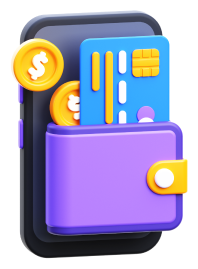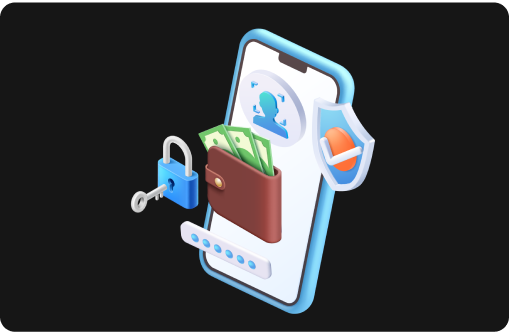Chapter 18: What is a Crypto wallet?
Understanding
Cryptocurrency
Wallets
A Comprehensive Guide


What is a Cryptocurrency Wallet?
A cryptocurrency wallet is a digital tool that enables users to store, send, and receive cryptocurrencies securely. Unlike traditional wallets that hold physical cash or cards, cryptocurrency wallets manage cryptographic keys – private keys and public addresses – that grant access to one’s digital assets on the blockchain. These wallets interact with blockchain networks to facilitate transactions, track balances, and provide a user-friendly interface for managing crypto holdings.
Types of Cryptocurrency Wallets:
Benefits of Wallet Connect:
-
Understanding NFTs:1
- Desktop Wallets: Installed on a computer or laptop, desktop wallets offer direct control over private keys and provide enhanced security features. Examples include Exodus and Electrum.
- Mobile Wallets: Designed for smartphones and tablets, mobile wallets offer convenience and accessibility, allowing users to manage their crypto assets on the go. Popular mobile wallets include Trust Wallet and Coinbase Wallet.
- Web Wallets: Hosted on web-based platforms, web wallets offer accessibility from any internet-connected device but may pose security risks due to reliance on third-party services. Examples include MetaMask and MyEtherWallet.
-
Hardware Wallets:2
- Hardware wallets are physical devices specifically designed to store cryptocurrency keys offline, providing the highest level of security against online threats such as hacking and malware. Popular hardware wallets include Ledger Nano S and Trezor.
-
Paper Wallets3
- Paper wallets involve storing cryptocurrency keys on a physical piece of paper or other offline mediums, offering a secure and low-tech storage solution. However, they require careful handling to prevent loss or damage.
-
Paper Wallets4
- Custodial wallets are managed by third-party service providers such as exchanges or online platforms, where users’ private keys are held on their behalf. While convenient, custodial wallets relinquish some degree of control and security to the service provider.
-
Best Practices for Cryptocurrency Wallet Usage:
- Secure Backup: Always maintain secure backups of your wallet’s seed phrase or private keys to prevent loss of access to your funds in case of device failure or loss.
- Regular Updates: Keep your wallet software and firmware up to date to ensure compatibility with the latest security patches and features.
- Use Strong Passwords: Choose strong, unique passwords for your wallet accounts and enable two-factor authentication (2FA) where available to enhance security.
- Exercise Caution: Be wary of phishing scams, malware, and fraudulent schemes targeting cryptocurrency users. Verify the authenticity of wallet software and only transact with reputable platforms and exchanges.
- Exercise Caution: Be wary of phishing scams, malware, and fraudulent schemes targeting cryptocurrency users. Verify the authenticity of wallet software and only transact with reputable platforms and exchanges.
Conclusion: Cryptocurrency wallets play a pivotal role in the adoption and utilization of digital assets, providing users with the means to securely store, manage, and transact with cryptocurrencies. By understanding the different types of wallets available and adhering to best practices for usage, individuals can safeguard their crypto holdings and engage confidently in the exciting world of cryptocurrencies.

ERC tokens are an integral part of the Ethereum blockchain ecosystem, facilitating a wide range of functionalities.

In the rapidly evolving landscape of Web3 technologies, security plays a critical role in safeguarding.


